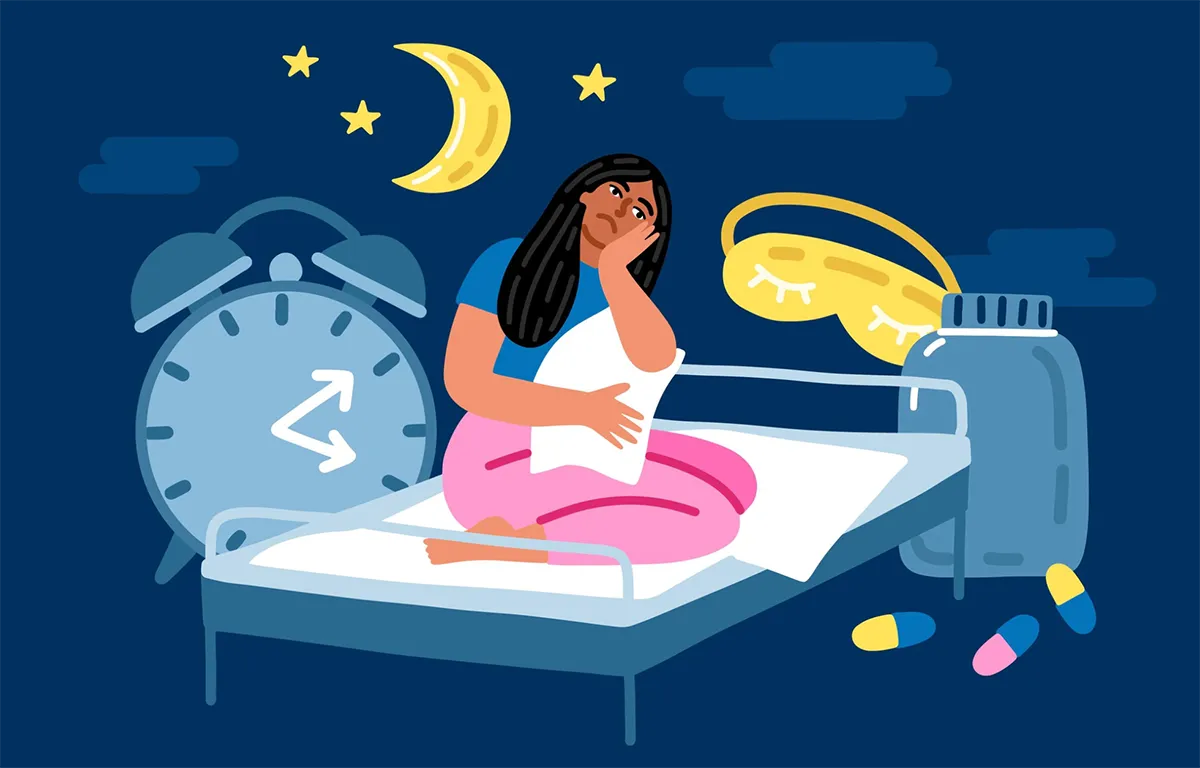Learn More About Melatonin Research Studies
What Are Melatonin Research Studies?
The hormone your brain produces as a response to darkness is what we refer to as melatonin. From correcting the timing of your circadian rhythms to helping you sleep, melatonin serves your body in many ways.
With the increasing popularity of melatonin supplements among individuals, it's only justified to look into the role it plays in improving or deteriorating the quality of life. The mainstream notion surrounding the use of these supplements is that they are quite helpful if you're struggling with certain conditions, such as delayed sleep-wake phase disorder, anxiety before and after surgery, jet lag, and sleep disorders.
Melatonin research studies cover a wide range of subjects. While most focus on its role in regulating sleep patterns, others tend to take it beyond the area of sleep.

Today, research studies for melatonin are much more relevant than before. They focus on areas such as depressive disorders, variations in the biological timing system, the status of circadian rhythm becoming irregular with age, and mood disorders.
While the FDA regulates dietary supplements like melatonin, dietary supplement regulations are not the same as regulations for over-the-counter or prescription drugs. In a nutshell, they're a lot less strict than the latter.
Why Is Melatonin Being Studied Through Research Studies?
For one, melatonin is not only a circadian rhythm-correcting hormone. Today, it has greater therapeutic value than ever before. Studying melatonin through research studies can help researchers determine its role in preventing and treating depressive disorders, cardiovascular diseases, and even osteoporosis.
Since clock gene dysfunction plays a role in mood disorders, including bipolar disorder, unipolar depression, and seasonal affective disorder, it is reasonable to conduct more research studies and understand how melatonin fits into the equation.
However, studying melatonin through research studies is also about understanding the efficacy of the hormone in aiding with conditions other than the ones stated above. There's enough information in the air about the effectiveness of melatonin in treating conditions such as fibromyalgia, ocular diseases, gastrointestinal tract diseases, diabetes, aging, etc. not much is present in the form of trials or research to prove it.
Nonetheless, it has actively been used as a complementary treatment in neonatal care, in vitro fertilization, and anesthesia. Hence, it's safe to conclude that research on melatonin is still one of the major hot spots in the field of disease treatment.
What Are Some Conditions that Melatonin Can Treat?
In terms of its therapeutic applications, melatonin is used in a number of ways. On the surface, it can do wonders for sleep disorder management, jet lag, resynchronization of circadian rhythms, and even as additive therapy in cancer. Here are all the ways in which melatonin can be used to treat various conditions:

Headaches
There is limited but promising evidence that melatonin can also treat some headaches. It is especially effective in treating migraine and cluster headaches. However, there is still no agreement between researchers about the right dose and formula that may work best for people with headaches.
Sleep Disorders
A healthy body produces enough melatonin to help you sleep. However, if it doesn't, melatonin supplements can prove to be helpful. According to a 2013 study, melatonin played a vital role in improving sleep duration, improving the quality of sleep, and reducing the time it takes to fall asleep.
Again, it may not be as effective as sleep aids, but it certainly doesn't have as many side effects. Melatonin supplements can help prevent shifts in sleep and wake times, especially in those with jet lag and insomnia.
Alzheimer's Disease
It is well-known among researchers and healthcare professionals that melatonin levels tend to go down with age. However, this change is much more apparent in those with Alzheimer's disease.
According to a 2013 study about the use of melatonin for Alzheimer's, it was concluded that the hormone (melatonin) was effective in slowing down cognitive decline.
Cancer
Researchers believe that melatonin, alongside radiation and chemotherapy, can effectively treat cancer. Again, there isn't enough evidence to prove it, and researchers need to conduct more research to reach a definitive answer.
Nonetheless, there is still some credible evidence that suggests that melatonin can mitigate cancer in the initiation, progression, and metastasis phases. However, the decision about using it is taken by relevant oncologists or cancer doctors since melatonin should not interfere in any way with their ongoing treatments for cancer.
Radioactivity Protection
While radiation therapy is extremely effective in treating different types of cancers, it can also result in severe side effects. This is where melatonin acts as an antioxidant to help combat the damage incurred by patients.
However, speaking to the relevant oncologist is highly recommended so the melatonin does not interfere with the ongoing treatment.
Tinnitus
Tinnitus is a condition in which people hear ringing or other sounds in one or both ears. They might also hear whistling, roaring, hissing, and other high or low-pitched sounds.
Based on a 2014 study, melatonin proved to be useful to some extent in improving these symptoms. However, it is still unknown whether it was due to the antioxidant properties of melatonin or the improved quality of sleep.
What Are Some Recent Breakthrough Research Studies on Melatonin?
2018: Melatonin Prevents Cancer Growth
The study was conducted keeping in mind the higher incidence of certain cancers in shift workers. It used evidence from studies of hemopoietic neoplasms, which show that melatonin prevents the proliferation of many different cancer cells.
Possible mechanisms may vary with the type of cancer and/or cell. However, it is interesting to note that the cytotoxic effect of this hormone in cancer cells involves ROS production. On the other hand, in normal cells, the same melatonin hormone has a completely opposite effect. It mainly has antioxidant effects since it's a scavenger of nitrogen and oxygen radicals. There's also evidence that melatonin protects lymphoid tissue and bone marrow during immunotherapy and allows bone marrow regeneration during chemotherapy.
2021: Melatonin Affects Key Physiological Functions
This research aimed to look into the roles that the melatonin molecule played in different processes, such as reproduction and circadian rhythms. Before this, it was well-recognized that melatonin played a role in sleep regulation, circadian rhythm modulation, cancer treatment, and immunity enhancement in both humans and animals.
However, this time, the research was conducted on two genetically identical mice to demonstrate what endogenous melatonin did. One mouse did not produce melatonin, while the other did. Researchers concluded that endogenous melatonin was involved in the modulation of the physiological functions stated above.
Even though previous studies of the same nature had also been conducted, they were done on rodents whose pineal glands were removed. As a result, the production of melatonin was blocked, so there wasn't clear evidence about whether the observed effect was due to the lack of melatonin or other molecules.
Findings of this recent research allowed for further investigations to take place, particularly about the role of endogenous melatonin on bone formation, the immune system, inflammation, and much more. In short, the researchers found that endogenous melatonin facilitated the body's adjustment to abrupt changes in the dark/light cycle, decreased reproductive performance, decreased body weight, and induced daily torpor.
2022: A Higher Dose of Melatonin Improves Sleep
This small study had healthy adults aged 55 and above. Participants were assigned to receive two weeks of either a low or high melatonin dose and two weeks of a placebo pill. Then, the researchers recorded different sleep metrics, such as muscle tone, eye movement, and brain waves, using polysomnography.
The results revealed that there was no significant change in overall sleep time in the low melatonin dose group. On the other hand, participants who took the 5 mg dose experienced a significant increase in sleep efficiency and total sleep time regardless of whether sleep was scheduled during the night or day.
Who Are Some Of The Key Opinion Leaders / Researchers / Institutions Conducting Melatonin Research Studies?
Center for Circadian and Sleep Medicine, Feinberg School of Medicine
CCSM, or the Center for Circadian and Sleep Medicine, is actively involved in conducting novel research studies that include basic research, clinical trials, translational research, and technology development. Researchers in the department are dedicated to improving health outcomes for patients with sleep and circadian rhythm disorders.
The teams are further expediting on how inadequate or disturbed sleep coupled with disturbed circadian timing is linked to an increase in the prevalence of disorders and diseases such as diabetes, cancer, cardiovascular disease, obesity, and much more.
Division of Sleep Medicine, Harvard Medical School
The Division of Sleep Medicine at Harvard Medical School is actively working towards establishing a model program in circadian and sleep biology. The department also aims to mobilize its scientific and intellectual resources to introduce programs for educating the masses and setting new clinical practice standards.
Furthermore, it aims to educate patients and physicians about the causes, consequences, and treatment of sleep disorders. All in all, the goal is to foster more collaborative research, develop better guidelines and establish the permanence of sleep medicine at Harvard Medical School.
MIT researchers have recently issued melatonin-related research in the Journal of Clinical Endocrinology and Metabolism. One of the key researchers behind it was Richard Wurtman, the Cecil H. Green Distinguished Professor and program director of the Clinical Research Center.
Dr. Wurtman has conducted several researches to identify mechanisms that control different aspects of brain chemistry in both humans and rodents. So far, he has published more than 1000 papers on diverse topics such as nutrition and the brain, circadian rhythms, neurotransmitters, neurodegeneration, appetite control, neuronal membrane synthesis, and treatments for various neurological diseases.
He received his M.D. from Harvard Medical School in 1960 and his A.B. in Philosophy and Chemistry from the University of Pennsylvania in 1956. He also went on to complete his Clinical Training in Endocrinology and Medicine at Massachusetts General Hospital and postdoctoral training at the National Institutes of Health before joining the MIT faculty in 1970.
All in all, he has extensively studied the impact of melatonin on insomnia among older people. He was among the few researchers who recognized that insomnia could be corrected by determining the right doses which give people rather "youthful" blood melatonin levels.